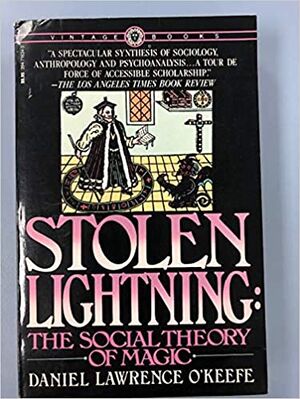Stolen Lightning (nonfiction)

Stolen Lightning: The Social Theory of Magic is a 1983 book by Daniel Lawrence O'Keefe concerning the origins and development of magic, religion, the self, the individual, and a wide range of related topics.
Structure
The Seven Provinces
- Medical magic
- Black magic
- Ceremonial magic
- Religous magic
- The occult sciences
- The paranormal
- Magic cults and sects
General theory deduced from classics
- Marx
- The Durkheim school
- Max Weber
Definitions of magic
- In the weak sense
- In the strong sense
Books
- Book One: Symbols
- Postulate 1: Magic is a form of social action
- Postulate 2: Magic social action consists of symbolic performances — and linguistic symbolism is central to magic
- Postulate 3: Magical symbolic action is rigidly scripted
- Postulate 4: Magical scripts achieve their social effects largely by pre-existing or pre-figured agreements
- Books Two: Religions
- Postulate 5: Magic borrows symbolism from religion and uses it to argu3e with religion in a dialectic that renews religion
- Postulate 6: Logically, and in some observable historical sequences, magic derives from religion rather than vice versa
- Postulate 7: Magic is a byproduct of the projection of society in religion
- Postulate 8: Religion is the institution that create or models magic for society
- Book Three: Individuals and Selves
- Postulate 9: Magic tries to protect the self
- Postulate 10: Magic helped develop the institution of the individual
- Postulate 11: Magic — especially Black Magic — is an index of social pressure on selves and individuals
- Postulate 12: Magic persists as an expression of certain aspects of civilization
- Postscript: History
- Postulate 13: Magical symbolism travels easily and accumulates a history
Excerpts
Magic Fights Religion As Superego
Wilhelm Stekel: Magic Fights Religion As Superego
The idea that magic fights social pressure, superego, even religion, is more explicit in Stekel, especially in Compulsion and Doubt, his study of the obsessional-compulsive neurosis. Many psychiatrists have found it natural to describe the spectacular symptoms of this neurosis in metaphors of magic. Harry Stack Sullivan alleged that the compulsive was once a child who had frightening and unpredictable parents and learned that he could "magically" control their behavior with words — up to a point. Thus compulsives try to control events through word formulas — and hence the "doubt," because "it doesn't always work."
pp. 275-276
Wilhelm Stekel (German: [ˈʃteːkəl]; 18 March 1868 – 25 June 1940) was an Austrian physician and psychologist, who became one of Sigmund Freud's earliest followers, and was once described as "Freud's most distinguished pupil".[1] According to Ernest Jones, "Stekel may be accorded the honour, together with Freud, of having founded the first psycho-analytic society"; while he also described him as "a naturally gifted psychologist with an unusual flair for detecting repressed material."[2] He later had a falling-out with Freud, who announced in November 1912 that "Stekel is going his own way".[3] His works are translated and published in many languages.
- Wilhelm Stekel @ Wikipedia
Magic defends the self against society
My deduction: Magic defends the self against society.
What, then, is magic? if religion is the projection of the overwhelming power of the group, and if magic derives from religion, but sets itself up on a somewhat independent basis to help individuals, and is, at the same time, frequently reported to be hostile toward religion ... the is not the answer apparent? Magic is the expropriation of religious collective representations for individual or subgroup purposes — to enable the individual ego to resist psychic extinction or the subgroup to resist cognitive collapse. Therefore, magic must have something to do with the parturition of individual monads out of the collective whole, and with the separation of subgroups from it.
Reviews
A Los Angeles Times book review called this book "a spectacular synthesis of sociology, anthropology, and psychoanalysis ... a tour de force of accessible scholarship".
The New York Times Book Review said it is "a powerful explication of how deeply magic is embedded in society."
Commonweal classified it as "a potential classic".
In the News
Fiction cross-reference
Nonfiction cross-reference
External links
- Daniel O'Keefe (writer) @ Wikipedia